31 May 2019 | Ukraine Incident Reports
[vc_row][vc_column][vc_column_text]
Index on Censorship’s Monitoring and Advocating for Media Freedom project tracks press freedom violations in five countries: Azerbaijan, Belarus, Russia, Turkey and Ukraine. Learn more.
[/vc_column_text][/vc_column][/vc_row][vc_row][vc_column][vc_custom_heading text=”9 Incidents” use_theme_fonts=”yes”][vc_custom_heading text=”Online outlet correspondent assaulted by politician” font_container=”tag:h3|text_align:left” use_theme_fonts=”yes”][vc_column_text]16 May 2019 — Oleg Baturin, New Day online outlet correspondent, was assaulted by a deputy of the Kherson regional council in Kahovka. The official blocked the journalist, grabbed his hands and threatened to cripple him.
Link(s): http://nikcenter.org/newsItem/50465
http://nk-online.com.ua/kahovskiy-zhurnalist-ne-hochet-stat-kalekoy-poetomu-obratilsya-v-politsiyu/
Categories: Physical Assault/Injury
Source of violation: Government/State Agency/Public official(s)/Political party[/vc_column_text][vc_custom_heading text=”Journalist assaulted by a government official in Kyiv” font_container=”tag:h3|text_align:left” use_theme_fonts=”yes”][vc_column_text]15 May 2019 — Volodymyr Tymofiychuk, 1+1 TV Channel correspondent, was assaulted by a government official in Kyiv. The official pushed the journalist, grabbed his clothes and hands.
Link(s): https://detector.media/community/article/167526/2019-05-23-zhurnalist-11-podav-u-politsiyu-zayavu-cherez-pereshkodzhannya-z-boku-pratsivnika-kabinetu-ministriv/
https://imi.org.ua/news/zhurnalist-1-1-napysav-zaiavu-u-politsiiu-cherez-pereshkodzhannia-z-boku-posadovtsia-kabminu/
Categories: Physical Assault/Injury
Source of violation: Government/State Agency/Public official(s)/Political party[/vc_column_text][vc_custom_heading text=”Editor-in-chief’s car set on fire” font_container=”tag:h3|text_align:left” use_theme_fonts=”yes”][vc_column_text]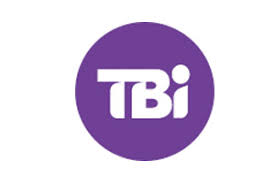 12 May 2019 — The editor-in-chief of TVi Channel Vladimir Yegorov said that his car was set on fire in Kyiv, the Ukrinform news agency reported.
12 May 2019 — The editor-in-chief of TVi Channel Vladimir Yegorov said that his car was set on fire in Kyiv, the Ukrinform news agency reported.
“Today, at 4:30 am, my car was set on fire, I associate it with my professional activity,” Yegorov posted on Facebook. According to Yegorov’s version of events, arson is suspected because his neighbors heard the sound of an explosion before the car caught fire.
Ukraine’s National Police launched a criminal investigation under the “intentional destruction or damage to property” of the country’s criminal code. Yegorov said he would ask the police to reframe the case under the article “intentional destruction or damage to the property of the journalist”, according to Detector Media online outlet.
Sources:
https://www.ukrinform.ua/rubric-kyiv/2698400-golovnomu-redaktoru-telekanalu-spalili-avtivku.html
https://www.facebook.com/permalink.php?story_fbid=2667278600009174&id=100001811816352
https://kyiv.npu.gov.ua/news/Informacziya/policziya-rozpochala-kriminalne-provadzhennya-za-faktom-zagoryannya-avtomobilya/
https://detector.media/community/article/167195/2019-05-12-politsiya-vidkrila-provadzhennya-za-faktom-pidpalu-avtivki-golovnogo-redaktora-tvi/
Categories: Attack to Property
Source of violation: Unknown[/vc_column_text][vc_custom_heading text=”TV crew assaulted by customs officers” font_container=”tag:h3|text_align:left” use_theme_fonts=”yes”][vc_column_text]9 May 2019 — Natalia Polishchuk, Maria Petruchyk and Vyacheslav Moroshko — journalists working for Avers TV channel — were assaulted by customs officers at the Yagodyn border crossing with Poland.
The journalists were investigating a large shipment of amber, which was alleged to have been smuggled to Poland through the Yagodyn customs station. They entered a restaurant where customs agents were attending a party and began asking questions about corruption and the amber smuggling. According to Avers, the officers who were present behaved aggressively and assaulted the journalists. One journalist’s finger was bruised and the crew’s camera was broken, 1+1 TV channel reported.
“Two men approached me, they started tugging at me, tore my jacket, hit the cameraman, hit the camera,” Polishchuk said. Petruchyk reported, “He wrestled my phone out of my hand, used brute force, my hand is damaged, he tore my journalist’s ID off me.” The officers also forcibly took the journalists’ driver’s licenses, car documents and bank cards. A customs officer told one of the journalists he would “bury her” the following day. The journalists managed to film a part of the incident.
The police have opened criminal proceedings on three articles. “It’s about interfering with the professional activities of journalists, robbery and causing intentional light bodily injuries,” Viktor Homol, spokesperson for the National Police in the Volyn region, said. The case is now being investigated by the State Bureau of Investigations.
Sources:
https://www.volynnews.com/news/extreme/piani-volynski-mytnyky-pobyly-ta-pohrabuvaly-znimalnu-hrupu-telekan/
https://tsn.ua/ukrayina/zhurnalistiv-na-volini-pobili-mitniki-spravu-rozsliduye-dbr-1343535.html
Categories: Physical Assault/Injury, Attack to Property, Blocked Access
Source of violation: Government/State Agency/Public official(s)/Political party
[/vc_column_text][/vc_column][/vc_row][vc_row][vc_column][vc_custom_heading text=”Journalists assaulted during commemoration rally” font_container=”tag:h3|text_align:left” use_theme_fonts=”yes”][vc_column_text]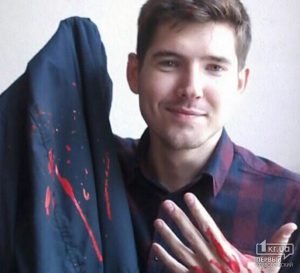 9 May 2019 — Unidentified persons threw red paint on people during a commemorative march in the Dnipro city (Dnipropetrovsk). As a result of the attack, a journalist from Kryvyi Rih and the operator of the 34th TV channel were injured, Pervyy Krivorozhskiy TV channel reported.
9 May 2019 — Unidentified persons threw red paint on people during a commemorative march in the Dnipro city (Dnipropetrovsk). As a result of the attack, a journalist from Kryvyi Rih and the operator of the 34th TV channel were injured, Pervyy Krivorozhskiy TV channel reported.
The names of the journalists were not reported. The National Police confiscated items that were stained with paint. The journalists filed a complaint with the police, demanding the investigation to be opened under the article “obstructing the professional activities of journalists” of the criminal code of Ukraine. However, the police opened a case under the article “hooliganism”.
Sources:
https://1kr.ua/news-50606.html
https://dp.npu.gov.ua/news/podiji/stanom-na-1500-v-policziji-vidkrito-4-kriminalni-provadzhennya-pov-yazani-z-podiyami-pid-chas-masovix-zaxodiv/
https://imi.org.ua/news/u-dnipri-pid-chas-mitynhu-postrazhdala-znimal-na-hrupa-34-kanalu/
Categories: Attack to Property
Source of violation: Unknown[/vc_column_text][/vc_column][/vc_row][vc_row][vc_column][vc_custom_heading text=”Journalist receives death threat after arson attack on her home” font_container=”tag:h3|text_align:left” use_theme_fonts=”yes”][vc_column_text]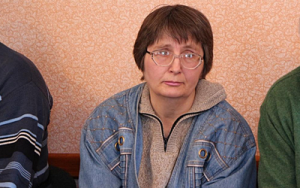 8 May 2019 — Nataliya Kamyshnikova, s journalist for the Radar local online news outlet in Novovolynsk city, was threatened with death, the Institute of Mass Information (IMI) reported. A week earlier, unknown persons set fire to the journalist’s house.
8 May 2019 — Nataliya Kamyshnikova, s journalist for the Radar local online news outlet in Novovolynsk city, was threatened with death, the Institute of Mass Information (IMI) reported. A week earlier, unknown persons set fire to the journalist’s house.
“Yesterday to my friend came close a woman under thirty – with dyed hair, in black glasses in the central market of the city of Novovolynsk. The woman firmly took her by the hand and said: Tell Kamyshnikova this was just the first warning. We will kill her, let her prepare a coffin,” the journalist wrote on Radar website.
On the night of May 1, two unidentified men set fire to a the house belonging to the journalist. Kamyshnikova claimed this had been done out of revenge for one of her articles.
According to IMI, the National Police began the criminal proceedings because of the threats to murder the journalist. Kamyshnikova said that in late January, an anonymous person on the internet threatened her with physical harassment. The journalist then complained to the police. She insisted on entering her case into the Uniform Register of Pre-trial Investigations and requested that criminal proceedings to be instituted. However, the police refused to open criminal proceedings.
Sources:
http://radar.in.ua/obitsyayut-ubyty-komu-zh-ya-tak-zavazhayu/
https://imi.org.ua/news/na-volyni-zhurnalisttsi-cherez-znayomu-peredaly-pohrozu-vbyvstvom/
https://www.volyn24.com/news/126120-vidomij-volynskij-zhurnalistci-pomstylysia-za-material-pidpalom-budynku
https://imi.org.ua/news/politsiia-vidkryla-spravu-cherez-pohrozy-vbyvstvom-volyns-kiy-zhurnalisttsi/
Categories: Intimidation, Attack to Property
Source of violation: Unknown[/vc_column_text][vc_custom_heading text=”Journalist assaulted in Odessa, had sewage poured at her” font_container=”tag:h3|text_align:left” use_theme_fonts=”yes”][vc_column_text]7 May 2019 — Svitlana Pidpala, activist, journalist and blogger, was assaulted in Odessa’s Summer Theater were she was filming a public event. An unidentified person poured a bucket of sewage on Pidpala. Her equipment was damaged.
Link(s): https://www.pravda.com.ua/rus/news/2019/05/7/7214411/
https://www.unn.com.ua/ru/news/1798498-v-odesi-aktivistku-oblili-fekaliyami-ta-nechistotami
Categories: Physical Assault/Injury, Attack to Property
Categories: Physical Assault/Injury, Attack to Property
Source of violation: Unknown[/vc_column_text][/vc_column][/vc_row][vc_row][vc_column][vc_custom_heading text=”Journalist falls into coma after assault” font_container=”tag:h3|text_align:left” use_theme_fonts=”yes”][vc_column_text]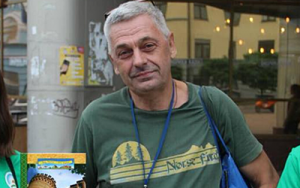 4 May 2019 — An unidentified person armed with a hammer assaulted journalist and blogger Vadim Komarov in the center of Cherkasy, IMI reported.
4 May 2019 — An unidentified person armed with a hammer assaulted journalist and blogger Vadim Komarov in the center of Cherkasy, IMI reported.
According to the National Police, Komarov was walking down the street, when an assailant hit him in the head several times and severly injured him. After that, the attacker fled the scene. Casual passers-by found the badly wounded journalist and called an ambulance at about 9 am. Komarov was operated on the local hospital. According to the doctors quoted on a local online news outlet Procherk, Komarov received an open craniocerebral trauma. The operation lasted two hours after which the journalist fell into a coma.
The police is investigating the case under the criminal article “assassination attempt”.
Komarov is known for his investigation of corruption among city authorities. The journalist has already been assaulted in the past. On 7 September 2016, an unknown person shot at Komarov in Cherkasy, but the bullet hit the wall.
UPDATE:
20 June 2019 — Vadim Komarov died in the hospital without regaining consciousness, IMI reported.
The OSCE Representative on Freedom of the Media, Harlem Désir, expressed his deep sorrow following the death of Komarov. “I am deeply shocked by the death of Vadim Komarov, who was brutally attacked last month in Cherkasy and suffered from serious head injuries,” Désir said. “Vadim Komarov was a well-known media professional who reported about issues of public importance for many years, including by exposing corruption and uncovering abuses of power.” “I strongly condemn this horrendous attack. Those responsible for this crime must be identified and face justice. I reiterate my call on the Ukrainian authorities to complete the investigation in a vigorous and swift manner. It is regrettable that about one-and-a-half months after the attack the law enforcement have not yet identified the perpetrators nor reported any progress on the investigation. Violence and attacks against journalists are unacceptable and must stop. Impunity would be a victory for those who wanted to silence Komarov and to intimidate the press. All OSCE participating States should take effective and resolute actions to prevent and end impunity for such crimes,” Désir said. “I send my sincere condolences to his family, colleagues and friends,” the Representative said.Head of the National Union of Journalists Serhiy Tomilenko said the cause of the murder was the Komarov’s journalistic work. “The murder of Vadim Komarov is a crime against all journalists in general,” Tomilenko said. Also, Tomilenko called journalists for solidarity, because this “topic is important for the survival of a journalist profession in Ukraine.”
Sources:
https://www.osce.org/representative-on-freedom-of-media/423578
https://www.facebook.com/sergiy.tomilenko/posts/2237747729643412?__tn__=K-R
https://imi.org.ua/news/pomer-cherkas-kyy-zhurnalist-vadym-komarov/
https://imi.org.ua/news/u-cherkasakh-pobyly-zhurnalista-vadyma-komarova-vin-u-vazhkomu-stani/
http://procherk.info/news/7-cherkassy/72109-zhorstoko-pobito-cherkaskogo-zhurnalista
http://procherk.info/news/7-cherkassy/72195-rozsliduetsja-kriminalne-provadzhennja-za-faktom-zamahu-na-vbivstvo-vadima-komarova
Categories: Physical Assault/Injury, Death/Killing
Source of violation: Unknown[/vc_column_text][/vc_column][/vc_row][vc_row][vc_column][vc_custom_heading text=”Armed woman assaulted Odessa journalist” font_container=”tag:h3|text_align:left” use_theme_fonts=”yes”][vc_column_text]2 May 2019 — A retired woman armed with a knife tried to assault Olena Solomonova, Odessa.online correspondent, and knocked the phone out of her hands during a commemorative event in Odessa.
Link(s): https://odesa.depo.ua/rus/odesa/aktivisti-z-chervonimi-kulyami-potrolili-kulikovtsiv-20190502957301
https://imi.org.ua/news/v-odesi-na-zhurnalistku-napaly-z-nozhem-i23135
Categories: Attack to Property
Source of violation: Unknown[/vc_column_text][vc_basic_grid post_type=”post” max_items=”4″ element_width=”6″ grid_id=”vc_gid:1575992589423-00806ef6-3f10-4″ taxonomies=”8996″][/vc_column][/vc_row]
31 May 2019 | Belarus, Belarus Incident Reports
[vc_row][vc_column][vc_column_text]
Index on Censorship’s Monitoring and Advocating for Media Freedom project tracks press freedom violations in five countries: Azerbaijan, Belarus, Russia, Turkey and Ukraine. Learn more.
[/vc_column_text][/vc_column][/vc_row][vc_row][vc_column][vc_row_inner][vc_column_inner][vc_custom_heading text=”8 Incidents” use_theme_fonts=”yes”][/vc_column_inner][/vc_row_inner][vc_custom_heading text=”Blogger Piatrukhin detained to prevent him from covering ecological protest in Brest” font_container=”tag:h3|text_align:left” use_theme_fonts=”yes”][vc_column_text]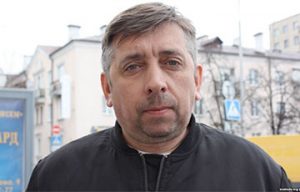 26 May 2019 – Blogger Siarhei Piatrukhin was preventively detained by the Brest police on the basis of a flimsy pretext and taken to the Leninski district police department shortly before the start of an ecological protest. He had to spend about an hour at the station.
26 May 2019 – Blogger Siarhei Piatrukhin was preventively detained by the Brest police on the basis of a flimsy pretext and taken to the Leninski district police department shortly before the start of an ecological protest. He had to spend about an hour at the station.
For more than a year, Brest residents have been protesting against the construction and launch of the iPower battery plant in the Brest free economic zone which may harm the environment in the region.
Link(s)
https://belsat.eu/en/news/ahead-of-protests-brest-blogger-preventively-detained/
Categories: Arrest/Detention; Blocked Access
Source of violation: Police/State security[/vc_column_text][/vc_column][/vc_row][vc_row][vc_column][vc_custom_heading text=”President signs decree allowing the blocking of websites during the European Games” font_container=”tag:h3|text_align:left” use_theme_fonts=”yes”][vc_column_text] 20 May 2019 – President Lukashenko signed decree №19 on security measures during the European Games in Minsk (17 June to 2 July).
20 May 2019 – President Lukashenko signed decree №19 on security measures during the European Games in Minsk (17 June to 2 July).
The authorities intend to temporarily block all the websites calling for participation in unauthorized protests during the European Games in Belarus. According to the document, from 20 May to 30 June this year such websites are to be detected and to be blacklisted within 24 hours.
In addition, the decree also prohibits the use drones at sports venues, hotels and fan zones during the European Games. Unauthorised drones will be seized until 2 July. The exception is the equipment belonging to the governmental bodies and the Games organizers.
Link(s)
https://baj.by/en/content/belarusian-government-block-websites-calling-protests-during-european-games
http://charter97.link/en/news/2019/5/21/334837/
Category: Legal Measures
Source of violation: Government[/vc_column_text][/vc_column][/vc_row][vc_row][vc_column][vc_custom_heading text=”Investigative journalist makes statement on his discrediting by Russian propaganda websites” font_container=”tag:h3|text_align:left” use_theme_fonts=”yes”][vc_column_text]16 May 2019 – The editor of the Belarusian service of the International Volunteer Community Inform Napalm and journalist for the Novy Chas newspaper Dzianis Ivashyn made an official statement on the smear campaign against him by some Russian websites. Ivashyn noted that some representatives of Belarusian media outlets are engaged in this campaign as well. The campaign began in mid-April 2019.
The main participants of the campaign, according to Ivashyn, are antimaydan.info, news-front.info, novorosinform.org, politnavigator.net, telegram channels 338 and Trikotazh and several others.
Ivashyn said he believes security ministries of the Russian Federation are behind the campaign due to the nature, method and channels of dissemination of disinformation about him.
Link(s)
https://baj.by/be/content/belaruski-zhurnalist-zayaulyae-pra-cisk-z-boku-rasiyskih-internet-resursau
Categories: Online Discredit
Source of violation: Another media[/vc_column_text][/vc_column][/vc_row][vc_row][vc_column][vc_custom_heading text=”Investigative journalist makes statement on his discrediting by Russian propaganda websites” font_container=”tag:h3|text_align:left” use_theme_fonts=”yes”][vc_column_text]16 May 2019 – The editor of the Belarusian service of the International Volunteer Community Inform Napalm and journalist for the Novy Chas newspaper Dzianis Ivashyn made an official statement on the smear campaign against him by some Russian websites. Ivashyn noted that some representatives of Belarusian media outlets are engaged in this campaign as well. The campaign began in mid-April 2019.
The main participants of the campaign, according to Ivashyn, are antimaydan.info, news-front.info, novorosinform.org, politnavigator.net, telegram channels 338 and Trikotazh and several others.
Ivashyn said he believes security ministries of the Russian Federation are behind the campaign due to the nature, method and channels of dissemination of disinformation about him.
Link(s)
https://baj.by/be/content/belaruski-zhurnalist-zayaulyae-pra-cisk-z-boku-rasiyskih-internet-resursau
Categories: Online Discredit
Source of violation: Another media[/vc_column_text][/vc_column][/vc_row][vc_row][vc_column][vc_custom_heading text=”Radio Racyja’s journalist failed to obtain accreditation from foreign ministry” font_container=”tag:h3|text_align:left” use_theme_fonts=”yes”][vc_column_text]15 May 2019 – The Belarusian ministry of foreign affairs denied accreditation to Yauhen Skrabets, a journalist for the Belarusian Radio Raciya (Poland), as a foreign correspondent.
In response to Yauhen Vapa, the head of the radio station, the ministry said that the accreditation had been denied because Radio Raciya had previously used non-accredited journalists in the last six months.
Link(s)
https://baj.by/be/content/mzs-belarusi-admovila-u-akredytacyi-yashche-adnamu-zhurnalistu-radyyo-racyya-kopiya-adkazu
Categories: Blocked Access; Legal Measures
Source of violation: State Agency[/vc_column_text][/vc_column][/vc_row][vc_row][vc_column][vc_custom_heading text=”Two independent journalist from Vitsebsk fined” font_container=”tag:h3|text_align:left” use_theme_fonts=”yes”][vc_column_text]15 May 2019 – The trial of independent journalists Alena Shabunia and Viachaslau Lazarau took place in the Navapolatsk town court. A judge found both journalists guilty of “illegal production and distribution of media content” under Article 22.9 of the Code of Administrative Offenses and fined them 637.50 Belarusian rubles (more than 300 dollars) each.
The pair were on trial because their video of an accident at the Polimir Navapolatsk enterprise was shown on Belsat TV channel.
Link(s)
http://charter97.link/en/news/2019/5/16/334236/
https://baj.by/be/content/vicebskih-zhurnalistau-ashtrafavali-za-videasyuzhet-pra-avaryyu-na-zavodze-palimir
Category: Fines
Source(s) of violation: Police, Court[/vc_column_text][/vc_column][/vc_row][vc_row][vc_column][vc_custom_heading text=”Foreign Ministry refused to accredit Radio Racyja journalist for the tenth time” font_container=”tag:h3|text_align:left” use_theme_fonts=”yes”][vc_column_text]14 May 2019 – A foreign ministry officer told Hrodna journalist Victar Parfionenka in a telephone conversation that he has been denied accreditation again.
Parfionenka has been contributing to the Belarusian Radio Racyja registered in Poland for 10 years. Every year he appeals to the Belarusian Ministry of Foreign Affairs for accreditation as a foreign correspondent and always gets rejected.
Link(s)
https://m.charter97.org/ru/news/2019/5/13/333944/
Categories: Blocked Access; Legal Measures
Source of violation: State Agency[/vc_column_text][/vc_column][/vc_row][vc_row][vc_column][vc_custom_heading text=”Ingush blogger detained and deported to Russia without trial” font_container=”tag:h3|text_align:left” use_theme_fonts=”yes”][vc_column_text]10 May 2019 – The authorities have ordered the extra-judicial deportation of Russian critical blogger Ismail Nalgiev after his arrest in the Minsk airport on 8 May 2019.
His lawyer said law enforcement agencies did not disclose the reasons for the blogger’s arrest. Nalgiev has been held in the detention center in Minsk since he was arrested at the airport while he was trying to leave Belarus. He was told that he was on the Russian list of wanted persons. Then the blogger was told that he was charged with a misdemeanor.
It was expected that the charge would be considered on May 10 by the Kastrychnicki district court of Minsk, but in the morning the detainee’s lawyer was informed that there would be no trial and Nalgiev had already been deported.
Link(s)
http://charter97.link/en/news/2019/5/10/333562/
https://belsat.eu/en/news/ingush-blogger-ismail-nalgiev-expelled-from-belarus-without-trial/
http://spring96.org/en/news/92886
https://baj.by/be/content/ingushskogo-blogera-vyslali-iz-belarusi-bez-suda
Categories: Arrest/Detention; Legal Measures
Source of violation: Police/State security[/vc_column_text][vc_custom_heading text=”More on this case” font_container=”tag:h3|text_align:left” use_theme_fonts=”yes”][vc_row_inner][vc_column_inner width=”1/4″][vc_single_image image=”107022″ img_size=”full” onclick=”custom_link” link=”https://www.indexoncensorship.org/2019/05/blogger-and-human-rights-defender-ismail-nalgiev-extra-judicially-deported-from-belarus/”][/vc_column_inner][vc_column_inner width=”3/4″][vc_column_text]
[/vc_column_text][/vc_column_inner][/vc_row_inner][/vc_column][/vc_row][vc_row][vc_column][vc_custom_heading text=”Journalists among those barred from attending a session on redevelopment in Minsk” font_container=”tag:h3|text_align:left” use_theme_fonts=”yes”][vc_column_text]3 May 2019 – Journalists were not allowed to attend the session on the redevelopment of a section of the center of Minsk, which was held in the Pershamaiski district administration of Minsk behind closed doors.
Two dozen local residents, who had submitted written appeals to be present at the session, gathered at the door, but they and media outlets — Radio Liberty and news website TUT.by — were barred from attending.
When Radio Liberty’s Ina Studzinskaya approached the door, a police senior lieutenant roughly threw her out of the office.
Link(s):
https://www.svaboda.org/a/29918765.html
http://charter97.link/ru/news/2019/5/3/332790/
Categories: Blocked Access, Physical Assault
Source of violation: State Agency, Police[/vc_column_text][/vc_column][/vc_row][vc_row][vc_column][vc_basic_grid post_type=”post” max_items=”4″ element_width=”6″ grid_id=”vc_gid:1560769127972-f4b1801a-f015-7″ taxonomies=”8996″][/vc_column][/vc_row]
3 May 2019 | Media Freedom, media freedom featured, News
[vc_row][vc_column][vc_single_image image=”103553″ img_size=”full”][vc_column_text]The investigation into the July 2016 murder of Belarusian journalist Pavel Sheremet in Kyiv, Ukraine continues to be shrouded in mystery. Ukrainian authorities have remained silent, releasing no new information since July 2017.
“The authorities in Ukraine must ensure that there is a fully transparent investigation and they must do their utmost to make real progress,” Joy Hyvarinen, head of advocacy at Index on Censorship said. “There are now too many unanswered questions related to the murder of Pavel Sheremet. The murder cannot be allowed to go unpunished.”
Journalists from the Organized Crime and Corruption Reporting Project, in partnership with Slistvo.info studied a number of leads on the case and analysed footage from more than 50 different surveillance cameras. They used their findings to create an investigative documentary called “Killing Pavel” which later won the IRE Medal, the highest honour that can be received for investigative journalism. One of the most significant findings detailed in the documentary, which was released in May 2017, was the revelation that a former Ukrainian secret service agent and two unidentified individuals were present outside Sheremet’s apartment when the explosives were planted under his car.
Petro Poroshenko, the former president of Ukraine, said in July 2016 that justice for Sheremet’s murder was a “matter of honour” and that the case would be treated with utmost priority. However, he has failed to follow through on this bold statement. Ambassadors from the USA, Canada, the UK, France, Germany, Italy and Japan have emphasised “the importance of continuing the investigation” in order to bring those responsible to justice. Pressures from other countries, human rights organisations and journalists rights groups, have had little effect on the overall progress of the investigation.
Sheremet, who primarily covered political figures, received considerable recognition for his work exposing corruption in Belarus, Russia and Ukraine. According to a letter from Olena Prytula, his partner and the owner of the Ukrainska Pravda news site, to the prosecutor general Yury Lutsenko, Sheremet “was stripped of his Belarusian citizenship due to his criticism of the Belarusian government”. In addition to spending three months in prison for speaking out against the government of Belarusian President Alexander Lukashenko, Sheremet’s Belarusian cameraman, Dzmitry Zavandski was also kidnapped and killed in 2000 after returning to Belarus from a reporting trip in Russia.
The presidents of Ukraine and Belarus met on 20 June 2017 to solely discuss “economic co-operation” between the two countries. However, this meeting was highly criticised by journalists for being held on the first anniversary of Sheremet’s murder and the honours with which Lukashenko was received by Poroshenko.
Poroshenko’s support of Lukashenko and his desire to establish closer relations with Belarus conflicted with the promises he made to attack corruption, and bring resolve to Sheremet’s case. Mustafa Nayyem, a Ukrainian journalist and the co-founder of the Hromadske Network, criticised Poroshenko for praising Lukashenko, whose acts of corruption and crimes against human rights directly tie him to Sheremet’s case. In a Facebook post that later received substantial support from the public, Nayyem wrote that Lukashenko “destroyed freedom of speech in his country, under whom hundreds of journalists have disappeared or been jailed” and emphasised the fact that it was “the very same Lukashenko under whom Pavel was sent to pretrial detention and his friend and cameraman was brutally murdered”.
Volodymyr Zelenskiy, a Ukrainian comedian who defeated Poroshenko in the Ukraine presidential election on 21 April 2019 by a landslide winning 73% of vote, has repeatedly denounced corruption and has promised to expel it from the Ukrainian government; however he has not yet addressed the future development of Sheremet’s case or any other unsolved cases. Although Sheremet’s case has been ignored for almost three years, it has not been forgotten.
On the second anniversary of Sheremet’s murder, Marie Yovanovitch, the US ambassador to Ukraine, said in an interview for Radio Liberty that Sheremet “played an immensely important role here in Ukraine, in terms of finding out what was happening and presenting it to the Ukrainian people so that they could make their own decisions about the situation in the Ukraine”. Furthermore, she emphasised the importance behind the renewal of the investigation, and stated that the “Ukrainian people deserve to know the truth about what happened”. However, the truth continues to be sidestepped regardless of continual demands from country ambassadors, human rights organisations, journalists and the Ukrainian community for justice.[/vc_column_text][/vc_column][/vc_row][vc_row][vc_column][vc_basic_grid post_type=”post” max_items=”4″ element_width=”6″ grid_id=”vc_gid:1556881896863-0ee92b86-a4fa-7″ taxonomies=”8568″][/vc_column][/vc_row]
30 Apr 2019 | Ukraine, Ukraine Incident Reports
[vc_row][vc_column][vc_column_text]
Index on Censorship’s Monitoring and Advocating for Media Freedom project tracks press freedom violations in five countries: Azerbaijan, Belarus, Russia, Turkey and Ukraine. Learn more.
[/vc_column_text][/vc_column][/vc_row][vc_row][vc_column][vc_row_inner][vc_column_inner][vc_custom_heading text=”5 Incidents” use_theme_fonts=”yes”][/vc_column_inner][/vc_row_inner][vc_column_text]
President of Ukraine asks security service to check 112-Ukraine and NewsOne as possible threats to national security
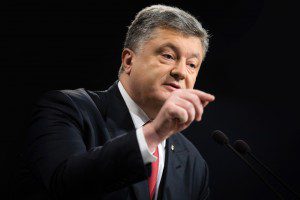 16 April 2019 – “The Verkhovna Rada adopted a resolution on the risks and threats to national security that come from two TV channels. Before addressing this issue, I commissioned a law enforcement agency that is responsible for national security in Ukraine, the SBU, to urgently check the information of the Verkhovna Rada,” president Petro Poroshenko said regarding the 112-Ukraine TV channel, answering a question regarding his plans to consider a petition in defense of the TV channels 112-Ukraine and NewsOne, which got over 25 thousand signatures.
16 April 2019 – “The Verkhovna Rada adopted a resolution on the risks and threats to national security that come from two TV channels. Before addressing this issue, I commissioned a law enforcement agency that is responsible for national security in Ukraine, the SBU, to urgently check the information of the Verkhovna Rada,” president Petro Poroshenko said regarding the 112-Ukraine TV channel, answering a question regarding his plans to consider a petition in defense of the TV channels 112-Ukraine and NewsOne, which got over 25 thousand signatures.
Poroshenko said that as soon as the check is completed, the TV channels will be provided with the results, and will be able to provide comments that will be taken into consideration.
Link(s): https://interfax.com.ua/news/election2019/581252.html
https://www.pravda.com.ua/rus/news/2019/04/16/7212440/
Categories: Legal Measures
Source of violation: Government/State Agency/Public official(s)/Political party, Police/State security
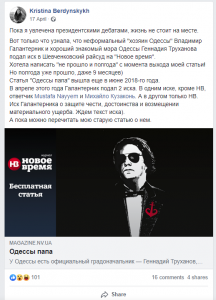 Novoye Vremya reports that there is another complaint filed against it
Novoye Vremya reports that there is another complaint filed against it
17 April 2019 – Businessman Volodymyr Halanternik filed a court complaint on the protection of honour and dignity against Novoye Vremia, a weekly magazine, journalist Khrystyna Berdynskyh posted on Facebook.
An informal “master of Odessa” Volodymyr Halanternik and a good acquaintance of the mayor of Odessa Gennady Trukhanov filed a complaint against Novoye Vremia weekly, she wrote. The journalist added that her article on Volodymyr Galanternik was published in June 2018. In her article Berdynskyh reported that Halanternik had a significant impact on politics and business in Odessa.
Link(s):
https://www.facebook.com/kristina.berdinskikh/posts/10158735452136164
https://imi.org.ua/news/u-novomu-vremeni-povidomyly-shcho-proty-nykh-podaly-shche-odyn-sudovyy-pozov/
https://detector.media/infospace/article/166555/2019-04-17-proti-novogo-vremeni-podali-shche-odin-pozov-do-sudu-berdinskikh/
Categories: Subpoena / Court Order/ Lawsuits
Source of violation: Known private individual(s)
Journalist beaten up by local politician in Odessa
16 April 2019 — Bogdan Osinskiy, Gromadske Slidstvo outlet correspondent and editor for Megafon website, was beaten up near a temple by Odessa regional council deputy Roman Senik and his mother. The journalist fell to the ground in the crowd, and Senik hit him in the face with his feet. The police intervened, but Senik’s mother attacked the journalist in the presence of the officers, hitting him multiple times, and Senik pushed a phone out of the journalist’s hands and smashed it.
Link(s): https://www.048.ua/news/2367344/draka-pod-hramom-deputat-vmeste-s-mamoj-pobil-zurnalista
https://dumskaya.net/news/konflikt-vokrug-hrama-na-pastera-deputat-napal-n-097828/
Categories: Physical Assault/Injury, Attack to Property
Source of violation: Government/State Agency/Public official(s)/Political party, Known private individual(s)
Head of Russian news agency office in Ukraine goes on trial for treason
4 April, 2019 — Prosecutors have accused Kirill Vyshinsky, the head of Russia’s state-run RIA Novosti’s office in Ukraine, of publishing “anti-Ukrainian” articles and materials at the beginning of his treason trial in the Kyiv court. The Podil District Court began the trial on 4 April, almost a year after the 52-year-old was detained by the Ukrainian Security Service (SBU) amid accusations that RIA Novosti Ukraine was participating in a “hybrid information war” waged by Russia against Ukraine. After hearing the prosecutors’ indictment, the court adjourned until April 15th. SBU officials have said Vyshinsky, who at the moment of his arrest had dual Russian-Ukrainian citizenship, received financial support from Russia via other media companies registered in Ukraine in order to disguise links between RIA Novosti Ukraine and Russian state media giant Rossia Segodnya. They also said he was receiving some 53,000 euros (about $60,000) a month from Russian sources for his work, and that the money was sent to him through Serbia. According to the SBU, Vyshinsky was preparing reports at Moscow’s request that sought to justify the seizure of Ukraine’s Crimean Peninsula by Russia in 2014. Vyshinsky faces up to 15 years in prison if found guilty of the charges against him.
Update: 15 April 2019 – The prosecutor’s office accused Vyshinsky on the basis of publication of 72 “anti-Ukrainian” articles, Radio Liberty reported. This was announced by the prosecutors when they announced the indictment in Podilsky district court of Kyiv. Prosecutors stated that these articles were posted by Vyshinsky between 2014 and 2018. According to the prosecutors, the materials contained “false, biased information about Ukraine, the Ukrainian authorities and the army and refuted the Russian aggression against Ukraine.” The prosecution also believes that these materials “justify the possible separation of certain regions of Donetsk and Luhansk regions from Ukraine”.
Update: 7 May 2019 — Podilsky District Court of Kyiv extended arrest to Vyshinsky until 22 July 2019, Radio Liberty reported. The prosecutor demanded that the court leave Vyshinsky arrested for another two months. He substantiated this with the fact that the defendant has Russian citizenship and can escape to Russia. The defense spoke against the extension of the arrest and requested that Vyshinsky be released under house arrest.
Link(s): https://www.radiosvoboda.org/a/news-vyshynskomu-zachytuyut-obvynuvachennya/29882290.html
https://www.radiosvoboda.org/a/news-vyshynskiy-ria-novosti/29861706.html
https://www.rferl.org/a/ukraine-vyshinsky-ria-novosti-ukraine-treason-trial/29861826.html
Categories: Arrest/ Detention, Criminal Charges/Fines/Sentences
Source of violation: Police/State security, Court/Judicial
Journalist assaulted by transport company employee
2 April 2019 — Zhytomyr.Life online outlet crew was assaulted by local transport company employee in Zhytomyr. The man attacked cameraman Vasyl Homyuk and twice tried to knock the camera out of his hands.
Link(s): https://detector.media/community/article/166064/2019-04-03-u-zhitomiri-zhurnalisti-zayavlyayut-pro-napad-u-marshruttsi/
https://zhitomir.life/10654-u-zhitomiri-predstavnik-pereviznika-napav-na-zhurnalistiv-video.html
Categories: Attack to Property
Source of violation: Known private individual(s)[/vc_column_text][/vc_column][/vc_row][vc_row][vc_column][vc_basic_grid post_type=”post” max_items=”4″ element_width=”6″ grid_id=”vc_gid:1575991602847-ad26670e-749a-1″ taxonomies=”8996″][/vc_column][/vc_row]
 12 May 2019 — The editor-in-chief of TVi Channel Vladimir Yegorov said that his car was set on fire in Kyiv, the Ukrinform news agency reported.
12 May 2019 — The editor-in-chief of TVi Channel Vladimir Yegorov said that his car was set on fire in Kyiv, the Ukrinform news agency reported.  9 May 2019 — Unidentified persons threw red paint on people during a commemorative march in the Dnipro city (Dnipropetrovsk). As a result of the attack, a journalist from Kryvyi Rih and the operator of the 34th TV channel were injured, Pervyy Krivorozhskiy TV channel reported.
9 May 2019 — Unidentified persons threw red paint on people during a commemorative march in the Dnipro city (Dnipropetrovsk). As a result of the attack, a journalist from Kryvyi Rih and the operator of the 34th TV channel were injured, Pervyy Krivorozhskiy TV channel reported. 8 May 2019 — Nataliya Kamyshnikova, s journalist for the Radar local online news outlet in Novovolynsk city, was threatened with death, the Institute of Mass Information (IMI) reported. A week earlier, unknown persons set fire to the journalist’s house.
8 May 2019 — Nataliya Kamyshnikova, s journalist for the Radar local online news outlet in Novovolynsk city, was threatened with death, the Institute of Mass Information (IMI) reported. A week earlier, unknown persons set fire to the journalist’s house. 4 May 2019 — An unidentified person armed with a hammer assaulted journalist and blogger Vadim Komarov in the center of Cherkasy, IMI reported.
4 May 2019 — An unidentified person armed with a hammer assaulted journalist and blogger Vadim Komarov in the center of Cherkasy, IMI reported. 
 26 May 2019 – Blogger Siarhei Piatrukhin was preventively detained by the Brest police on the basis of a flimsy pretext and taken to the Leninski district police department shortly before the start of an ecological protest. He had to spend about an hour at the station.
26 May 2019 – Blogger Siarhei Piatrukhin was preventively detained by the Brest police on the basis of a flimsy pretext and taken to the Leninski district police department shortly before the start of an ecological protest. He had to spend about an hour at the station. 20 May 2019 – President Lukashenko signed decree №19 on security measures during the European Games in Minsk (17 June to 2 July).
20 May 2019 – President Lukashenko signed decree №19 on security measures during the European Games in Minsk (17 June to 2 July).  16 April 2019 – “The Verkhovna Rada adopted a resolution on the risks and threats to national security that come from two TV channels. Before addressing this issue, I commissioned a law enforcement agency that is responsible for national security in Ukraine, the SBU, to urgently check the information of the Verkhovna Rada,” president Petro Poroshenko said regarding the 112-Ukraine TV channel, answering a question regarding his plans to consider a petition in defense of the TV channels 112-Ukraine and NewsOne, which got over 25 thousand signatures.
16 April 2019 – “The Verkhovna Rada adopted a resolution on the risks and threats to national security that come from two TV channels. Before addressing this issue, I commissioned a law enforcement agency that is responsible for national security in Ukraine, the SBU, to urgently check the information of the Verkhovna Rada,” president Petro Poroshenko said regarding the 112-Ukraine TV channel, answering a question regarding his plans to consider a petition in defense of the TV channels 112-Ukraine and NewsOne, which got over 25 thousand signatures.  Novoye Vremya reports that there is another complaint filed against it
Novoye Vremya reports that there is another complaint filed against it